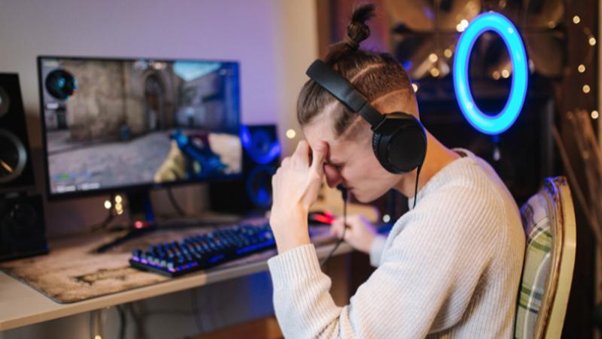 PUGB, or PlayerUnknown’s Battlegrounds, is a popular battle royale game that’s played online. It’s a massive game that’s enjoyed by significant numbers of players from around the world. However, recently it’s started to attract some negative attention for various reasons, resulting in some prominent streamers focusing on other games instead. In this article, we’ll look at the game itself and explain the reasons why its popularity has been in decline.
PUGB, or PlayerUnknown’s Battlegrounds, is a popular battle royale game that’s played online. It’s a massive game that’s enjoyed by significant numbers of players from around the world. However, recently it’s started to attract some negative attention for various reasons, resulting in some prominent streamers focusing on other games instead. In this article, we’ll look at the game itself and explain the reasons why its popularity has been in decline.
About PUBG
First, we’ll summarise the game itself. With console and computer sales of approximately 70 million, PUGB is one of the world’s best-selling video games of all time. The mobile version’s app has been downloaded over 1 billion times – just over one in seven people have downloaded it onto their phone or tablet at some point. Even though not everyone who downloads the game goes on to play it, the mobile version still attracts a huge and dedicated base of players. In fact, by December 2020, it had grossed approximately $4.3 billion in revenue.
The premise of the game is simple. Up to a hundred players are parachuted onto an island, and they have to scavenge for armour, weapons, healing items and other resources. They have to kill each other and avoid getting killed themselves. Whoever is the last player – or team – standing wins the game. The game becomes more interesting when the map’s play zone gradually decreases. This feature forces players to work with a smaller amount of space and makes encounters with others more familiar. If you end up outside of the play zone, you’ll gradually lose health; the later on in the game it is, the more quickly you’ll lose health for being outside.
As with other online games, there are regular content updates. These give players more reasons to play and encourage them to stick with the game. Things such as new maps, new weapons and new modes are typically included in updates.
Updates are great because they enable a game to grow. But, unfortunately, not all games have them. Online casino games, for example, don’t get updated just because they are designed for very quick and repetitive gameplay, with rounds lasting seconds, if that. Some of them do have sequels and enhanced versions, however. So, if you’re interested in trying out some online casino games, claim a free bonus no deposit casino UK.
Back to PUBG, it was created and published by a company called PUBG Corporation. This game is a subsidiary of Bluehole, a South Korean video game developer.

The game’s origin is rather interesting. It was based on mods – fan-made alternate versions of popular games – of several games that Brendan Greene, an Irish video game developer, had created. He was inspired by the Japanese movie Battle Royale and the Hunger Games novels, involving youngsters having to fight to the death. In Battle Royale, the Japanese totalitarian government forces high schoolers to participate in an organised, three-day event where they have to kill each other until one student is left. Likewise, in The Hunger Games, twenty-four children, a boy and a girl from each of the twelve districts of Panem are summoned to participate in the annual Hunger Games, where the sole survivor is declared the winner and allowed to live.
Brendan Greene’s online nickname was PlayerUnknown, hence the name of the company that would make and distribute PUBG. He wanted to bring the battle formats of Battle Royale and The Hunger Games and create a game where loads of people can fight to the death. He had to be careful not to entirely replicate the set-up of the source materials; to that end; he ensured that the game would include elements of randomisation.
PUBG was the first online video game to pioneer the battle royale concept. It was released on 20 December 2017 and was an instant success, gaining impressive sales figures and earning quite favourable reviews. Moreover, it paved the way for several similar games, most notably Fortnite.
Where Things Started to Go Wrong
For its first few years online, PUBG was one of the biggest games in the world. It was generating ridiculous amounts of money through sales and in-app purchases through the mobile version, and it had a broad and growing base of players. The game also won a string of prestigious industry awards, including:
- Best Multiplayer Game at the 35th Golden Joystick Awards in 2017
- Outstanding Achievement in Online Gameplay at the 21st Annual D.I.C.E. Awards in 2018
- Mobile Game of the Year at the 36th Golden Joystick Awards in 2018
The game quickly developed a substantial online following and has made waves in the world of eSports.
However, its following has been diminishing. Throughout 2018, the game averaged just over 1 million concurrent players on Stream and managed to peak at 2.5 million. However, by early 2020 the number of concurrent players had dropped to around a quarter of a million. Even though this is still a large number of players for a game, it’s nowhere near the figure the game had just over a year ago.
So what happened? What caused the game to experience such a sharp decline in regular players? Two key reasons have been put forward.
Bug Fixing vs New Content
People want games to be free of bugs. So when they play, they don’t want things to go wrong. They expect everything to be working as it should be. People have high expectations, especially when they’re paying a lot of money for a single game.
Of course, even the most prominent games by the biggest studios can have a few bugs in them when they launch. What usually happens is that these are ironed out almost immediately. If a game, or an update to a game, comes out and there are bugs, there will be a talk about it online on the same day, if not shortly after. Fans of the game will more often than not reach out to the developers and let them know. The developers will then release patches/updates to debug the game and set everything right.
With PUBG, it seems that the developers have been favouring new content over fixing pre-existing bugs. They have pushed ahead and introduced new features while neglecting various things that many players have been frustrated with. In addition, some updates have introduced new bugs to compound the problem, making the game even more fraught with issues.
Most players want the base game to be as good as possible before new content is introduced. If a developer favours updates instead of fixing things, it seems that the focus is on money and not ensuring the game is as good as possible.
Streamers are an essential part of the online video game industry. Many of them can earn a living from playing games and having people watch in real-time through live streams. They can be pretty influential in that they’re effectively promoting the games they play. If they’re enjoying a particular game, the streamers may tempt some of their followers to purchase the game themselves and give it a go.
Video game developers don’t want to get into streamers’ bad books. However, if many streamers criticise a game and have a valid reason for doing so, this can have a noticeable effect on a game’s player numbers and overall revenue.
What’s happened with PUBG is that some streamers have publicly quit the game because they’re disappointed with its quality and lack of attention to its issues. One of the most prominent ones, Chocotaco, announced a break from the game and cited a few reasons behind quitting temporarily. Something like this can be awful for a game that relies on having an online community, especially if negativity about the game spreads, which it can do very easily.
Bans
Another reason behind streamers leaving PUBG is the fact that the game has been banned in multiple countries. Some of the places where it’s been banned, either permanently or temporarily, include:
- India
- Pakistan
- Nepal
- Jordan
- Iraq
Governments and other authorities have enacted bans on PUBG because they feel it’s too addictive and has too much of a negative effect on children. The game is highly competitive and does encourage you to play again and again; you want to keep perfecting your skills and strategies, so you’re the last player standing. There are concerns that games like PUBG can have negative effects on children’s education and their physical health and mental well-being.
India went ahead with a complete ban of the mobile version, PUGB Mobile, in December 2020. However, it wasn’t the addictive nature of the game that was the reason for the ban; it was to do with the ongoing skirmishes between India and China at the time. The Indian government went ahead and banned over a hundred apps of Chinese origin. The reason for this was that the government felt the app operators were using players’ data in an unauthorised manner.
The ban had a huge knock-on effect on PUBG’s revenue and online community. Nearly a quarter of all of the game’s mobile players lived in India. With the ban, the game effectively lost a quarter of its player base overnight. Indian streamers had no choice but to leave the game – they couldn’t exactly promote a formally banned game.
The problem is that if the app becomes legal in India again, the game may struggle to get its Indian player base as big as it once was. The main reasons are the game’s negative reputation for its bugs and the fact that many players will simply switch to other games instead.
Summary
Despite being well received by players and winning some major awards, PUBG hasn’t had the most accessible rides recently. As a result, the game has been subject to bans for being too addictive and has even had its mobile app banned in its biggest market, though for a reason not to do with the app or game itself.
The pressing issue right now is the game’s performance. Streamers have been quitting because they’re fed up with the quality and believe, rightly so, that the developers shouldn’t be ironing out the bugs now – they should have done so ages ago and shouldn’t be prioritising new content when there are persistent issues.
PUBG is still a popular game and is still a quality release that’s enjoyed by many gamers. However, these days, no significant developers can get away with having their product go without essential bug fixes. We can’t deny the streamers and their influence. If streamers pick up on things like bugs not getting fixed, this can have a long-lasting impact on the game’s commercial performance and reputation.
